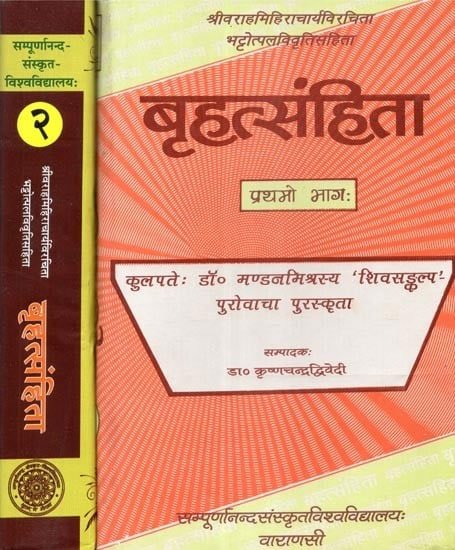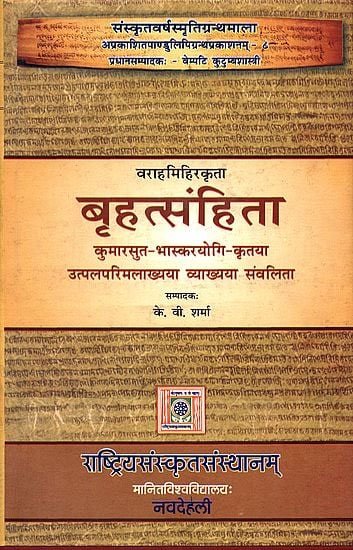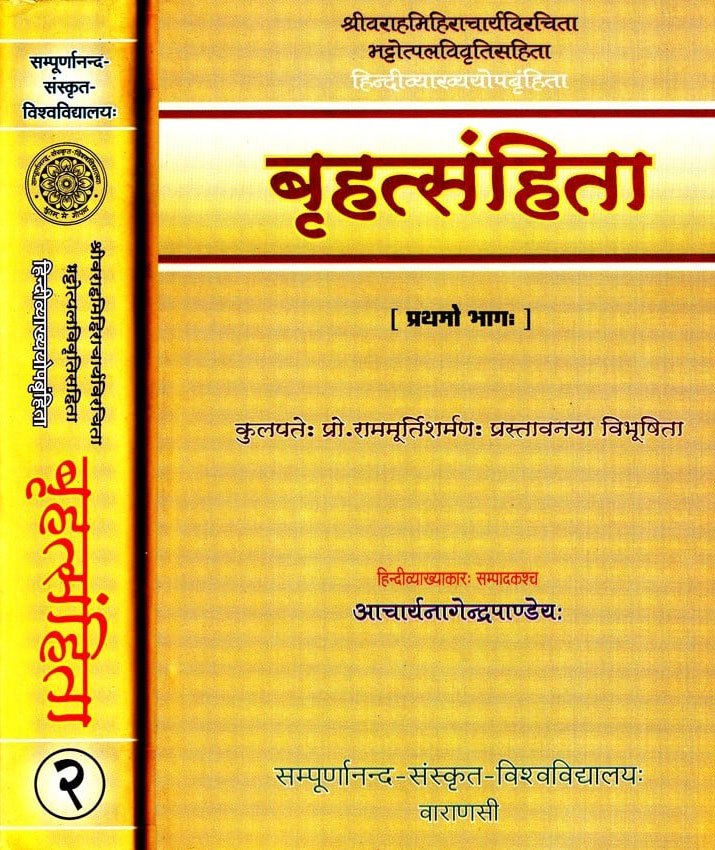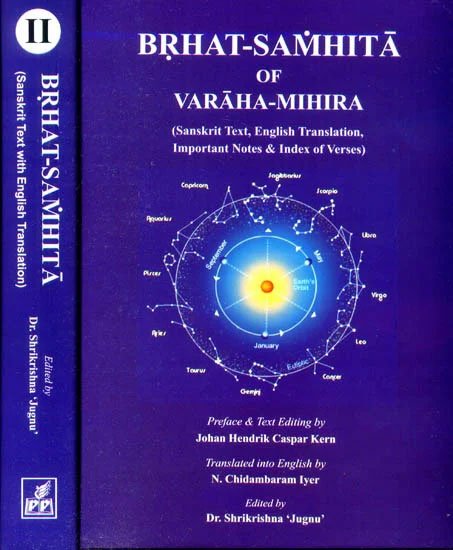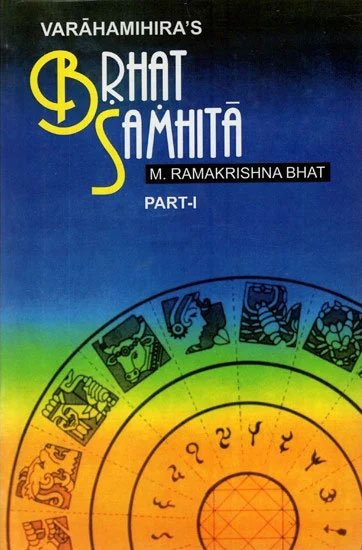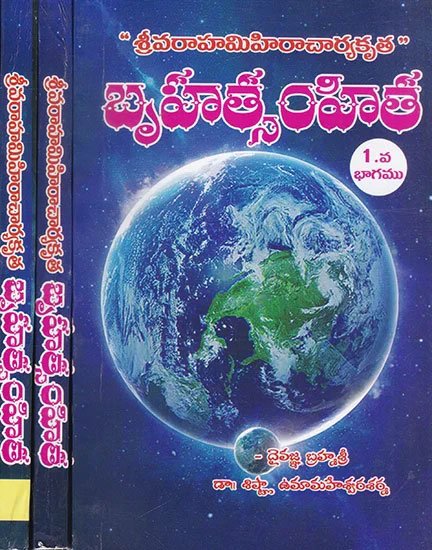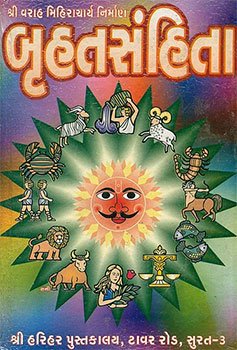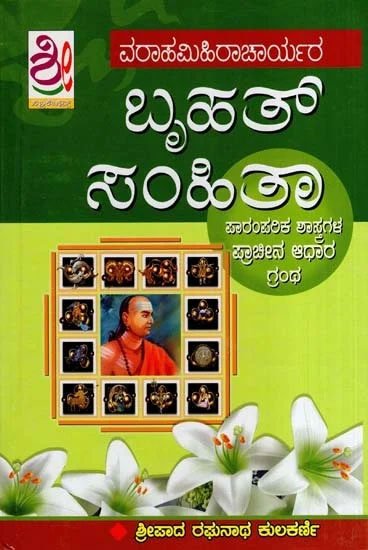Brihat-samhita [sanskrit]
26,560 words
The Sanskrit text of the Brihat-samhita from the 6th-century authored by Varaha Mihira in present-day Ujjain, India. It primarily deals with astrology and astronomy but is presented as an encyclopedia of knowledge.
Verse 19.2
तीक्ष्णं तपत्यदितिजः शिशिरेऽपि काले नात्यम्बुदा जलमुचोऽचलसन्निकाशाः ।
नष्टप्रभर्क्षगणशीतकरं नभश्च सीदन्ति तापसकुलानि सगोकुलानि ॥ २ ॥
tīkṣṇaṃ tapatyaditijaḥ śiśire'pi kāle nātyambudā jalamuco'calasannikāśāḥ |
naṣṭaprabharkṣagaṇaśītakaraṃ nabhaśca sīdanti tāpasakulāni sagokulāni || 2 ||
The Sanskrit text of Verse 19.2 is contained in the book Brihata Samhita (Sanskrit Text with Hindi Translation) by Pandit Achyutananda Jha. This book is available online or you could buy the latest edition:
Read online Buy now! The Sanskrit text by Pandit Achyutananda Jha (2001)
Glossary of Sanskrit terms
Note: This extracts Sanskrit terms and links to English definitions from the glossary, based on an experimental segmentation of verse (19.2). Some terms could be superfluous while some might not be mentioned. Click on the word to show English definitions.
Tikshna, Tapat, Tapati, Aditija, Shishira, Api, Kale, Kala, Nati, Ambuda, Jalamuc, Acala, Sannikasha, Nashta, Prabha, Riksha, Gana, Shitakara, Nabh, Nabha, Nabhas, Sidat, Sidanti, Tapasa, Kula, Sagu,
Analysis of Sanskrit grammar
Note: this is an experimental feature and only shows the first possible analysis of the Sanskrit text (Verse 19.2). If the system was successful in segmenting the sentence, you will see of which words it is made up of, generally consisting of Nouns, Pronouns, Verbs, Participles and Indeclinables. Click on the link to show all possible derivations of the word.
- Line 1: “tīkṣṇaṃ tapatyaditijaḥ śiśire'pi kāle nātyambudā jalamuco'calasannikāśāḥ ”
- tīkṣṇam -
-
tīkṣṇa (noun, masculine)[adverb], [accusative single]tīkṣṇa (noun, neuter)[adverb], [nominative single], [accusative single]tīkṣṇā (noun, feminine)[adverb]
- tapatya -
-
tapatī (noun, feminine)[compound], [adverb], [nominative single], [vocative single]tapat (noun, feminine)[locative single]tapat (noun, masculine)[locative single]tapat (noun, neuter)[nominative dual], [vocative dual], [accusative dual], [locative single]√tap -> tapat (participle, masculine)[locative single from √tap class 1 verb]√tap -> tapat (participle, neuter)[nominative dual from √tap class 1 verb], [vocative dual from √tap class 1 verb], [accusative dual from √tap class 1 verb], [locative single from √tap class 1 verb]√tap (verb class 1)[present active third single]
- aditijaḥ -
-
aditija (noun, masculine)[nominative single]
- śiśire' -
-
śiśira (noun, masculine)[locative single]śiśira (noun, neuter)[nominative dual], [vocative dual], [accusative dual], [locative single]śiśirā (noun, feminine)[nominative dual], [vocative single], [vocative dual], [accusative dual]
- api -
-
api (indeclinable preposition)[indeclinable preposition]ap (noun, neuter)[locative single]
- kāle -
-
kāle (indeclinable)[indeclinable]kāla (noun, masculine)[locative single]kāla (noun, neuter)[nominative dual], [vocative dual], [accusative dual], [locative single]kālā (noun, feminine)[nominative dual], [vocative single], [vocative dual], [accusative dual]
- nātya -
-
nāti (noun, masculine)[compound], [adverb], [nominative dual], [vocative dual], [accusative dual]nāti (noun, feminine)[compound], [adverb], [nominative dual], [vocative dual], [accusative dual]nāti (noun, neuter)[compound], [adverb], [nominative single], [vocative single], [accusative single]
- ambudā* -
-
ambuda (noun, masculine)[nominative plural], [vocative plural]
- jalamuco' -
-
jalamuc (noun, masculine)[nominative plural], [vocative plural], [accusative plural], [ablative single], [genitive single]jalamuc (noun, neuter)[ablative single], [genitive single]
- acala -
-
acala (noun, masculine)[compound], [vocative single]acala (noun, neuter)[compound], [vocative single]
- sannikāśāḥ -
-
sannikāśa (noun, masculine)[nominative plural], [vocative plural]sannikāśā (noun, feminine)[nominative plural], [vocative plural], [accusative plural]
- Line 2: “naṣṭaprabharkṣagaṇaśītakaraṃ nabhaśca sīdanti tāpasakulāni sagokulāni ”
- naṣṭa -
-
naṣṭa (noun, masculine)[compound], [vocative single]naṣṭa (noun, neuter)[compound], [vocative single]√naś -> naṣṭa (participle, masculine)[vocative single from √naś class 1 verb], [vocative single from √naś class 4 verb]√naś -> naṣṭa (participle, neuter)[vocative single from √naś class 1 verb], [vocative single from √naś class 4 verb]√naś -> naṣṭa (participle, masculine)[vocative single from √naś class 1 verb]√naś -> naṣṭa (participle, neuter)[vocative single from √naś class 1 verb]
- prabhar -
-
prabha (noun, masculine)[compound], [vocative single]prabha (noun, neuter)[compound], [vocative single]prabhā (noun, feminine)[nominative single]
- ṛkṣa -
-
ṛkṣa (noun, masculine)[compound], [vocative single]ṛkṣa (noun, neuter)[compound], [vocative single]
- gaṇa -
-
gaṇa (noun, masculine)[compound], [vocative single]
- śītakaram -
-
śītakara (noun, masculine)[adverb], [accusative single]śītakara (noun, neuter)[adverb], [nominative single], [accusative single]śītakarā (noun, feminine)[adverb]
- nabhaś -
-
nabhas (noun, masculine)[compound], [adverb], [vocative single]nabhas (noun, neuter)[compound], [adverb], [nominative single], [vocative single], [accusative single]nabh (noun, feminine)[nominative plural], [vocative plural], [accusative plural], [ablative single], [genitive single]nabha (noun, masculine)[nominative single]
- ca -
-
ca (indeclinable conjunction)[indeclinable conjunction]ca (noun, masculine)[compound], [vocative single]ca (noun, neuter)[compound], [vocative single]
- sīdanti -
-
√sad -> sīdat (participle, neuter)[nominative plural from √sad class 1 verb], [vocative plural from √sad class 1 verb], [accusative plural from √sad class 1 verb]√sad -> sīdantī (participle, feminine)[vocative single from √sad class 1 verb]√sad (verb class 1)[present active third plural]
- tāpasa -
-
tāpasa (noun, masculine)[compound], [vocative single]tāpasa (noun, neuter)[compound], [vocative single]
- kulāni -
-
kula (noun, neuter)[nominative plural], [vocative plural], [accusative plural]
- sago -
-
sagu (noun, masculine)[vocative single]sagu (noun, feminine)[vocative single]
- kulāni -
-
kula (noun, neuter)[nominative plural], [vocative plural], [accusative plural]
Other editions:
Also see the following editions of the Sanskrit text or (alternative) English translations of the Verse 19.2
Brhatsamhita with the Commentary of Bhattotpala
by Krishna Chandra Dwivedi (2016)
Publisher: Sampurnanand Sanskrit University; 1229 pages;
Buy now!
Brihat Samhita with the Commentary of Utpalapatimala of Yogisvara
by K. V. Sharma (2012)
Publisher: Rashtriya Sanskrit Sansthan, Janakpuri; 754 pages; ISBN-10; 8186111360; ISBN-13: 9788186111369
Buy now!
Brihat Samhita (Hindi Translation)
by K. V. Sharma (2002)
Publisher: Sampurnanand Sanskrit University; 2359 pages; ISBN-13: 9789387890008.
Buy now!
Brhat Samhita (English translation)
by N. Chidambaram Iyer (2022)
Publisher: Parimal Publication Pvt. Ltd.; 801 pages; Edited by Dr. Shrikrishna Jugnu; ISBN-10: 8171104215; ISBN-13: 9788171104215.
Buy now!
Brhat Samhita (English with notes)
by M. Ramakrishna Bhat (2010)
Publisher: Motilal Banarsidas Publishers Pvt. Ltd.; 1155 pages; ISBN-10: 8120810600; ISBN-13: 9788120810600.
Buy now!
Brhat Samhita (Telugu translation)
by Sishtla Umamaheswara Sharma (2020)
Publisher: Mohan Publications, Andhra Pradesh; 846 pages.
Buy now!Preview of verse 19.2 in Kannada sript:
ತೀಕ್ಷ್ಣಂ ತಪತ್ಯದಿತಿಜಃ ಶಿಶಿರೇಽಪಿ ಕಾಲೇ ನಾತ್ಯಮ್ಬುದಾ ಜಲಮುಚೋಽಚಲಸನ್ನಿಕಾಶಾಃ ।
ನಷ್ಟಪ್ರಭರ್ಕ್ಷಗಣಶೀತಕರಂ ನಭಶ್ಚ ಸೀದನ್ತಿ ತಾಪಸಕುಲಾನಿ ಸಗೋಕುಲಾನಿ ॥ ೨ ॥
Brhat Samhita (Gujarati translation)
by - (2000)
Publisher: Shree Harihar Pustakalay, Surat; Author: Shri Varahamihira Acharya (શ્રી વરાહમિહીરાચાર્ય); 432 pages.
Buy now!Preview of verse 19.2 in Gujarati sript:
તીક્ષ્ણં તપત્યદિતિજઃ શિશિરેઽપિ કાલે નાત્યમ્બુદા જલમુચોઽચલસન્નિકાશાઃ ।
નષ્ટપ્રભર્ક્ષગણશીતકરં નભશ્ચ સીદન્તિ તાપસકુલાનિ સગોકુલાનિ ॥ ૨ ॥
Brhat Samhita (Kannada translation)
by Sripada Raghunatha Kulkarni (2021)
Publisher: Srinidhi Publications, Bangalore; 668 pages with illustrations.
Buy now!Preview of verse 19.2 in Kannada sript:
ತೀಕ್ಷ್ಣಂ ತಪತ್ಯದಿತಿಜಃ ಶಿಶಿರೇಽಪಿ ಕಾಲೇ ನಾತ್ಯಮ್ಬುದಾ ಜಲಮುಚೋಽಚಲಸನ್ನಿಕಾಶಾಃ ।
ನಷ್ಟಪ್ರಭರ್ಕ್ಷಗಣಶೀತಕರಂ ನಭಶ್ಚ ಸೀದನ್ತಿ ತಾಪಸಕುಲಾನಿ ಸಗೋಕುಲಾನಿ ॥ ೨ ॥
![Brihat-samhita [sanskrit] - book cover](/uploads/a/Brihat-Samhita-Sanskrit.jpg)
